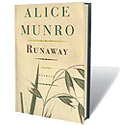
No one would ever mistake Alice Munro for an author of delicate sensibilities. (In “Carried Away,” from 1994’s Open Secrets, a man plucks a recently decapitated head off a factory floor.) Still, a grim streak runs through Munro’s new collection, Runaway, greater than the physical carnage of her earlier work. A woman frets over her lover’s infidelity; he is immediately killed in a storm. After living out life as a spinster, a woman learns that the man she thought rejected her was really that suitor’s twin. An adopted girl is pursued by her birth mother, who tells her that the family’s actual adopted infant was killed long ago. Many of these stories, in less deft hands, would be unconscionably purple. Still, Munro’s strength has always been the accumulation of seemingly unrelated detail—the frayed ends of the story yanked suddenly into a knot. But throughout Runaway’s tales, Munro sacrifices her characters to the vagaries of chance with a sheer ruthlessness that is close to unbearable. “As if she was at the edge of a flat body of water that stretched on and on,” a character describes her lover-to-be in “Passion.” “Looking out at such dark, cold, level water, and knowing it was all there was.” It is, to say the least, an atypical take on burgeoning love. Only Munro could make it seem terribly true.